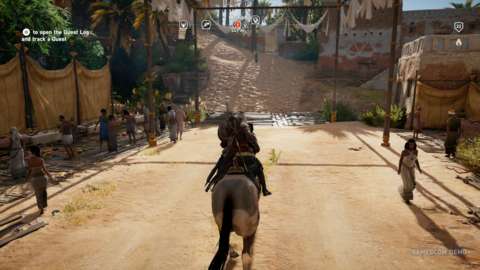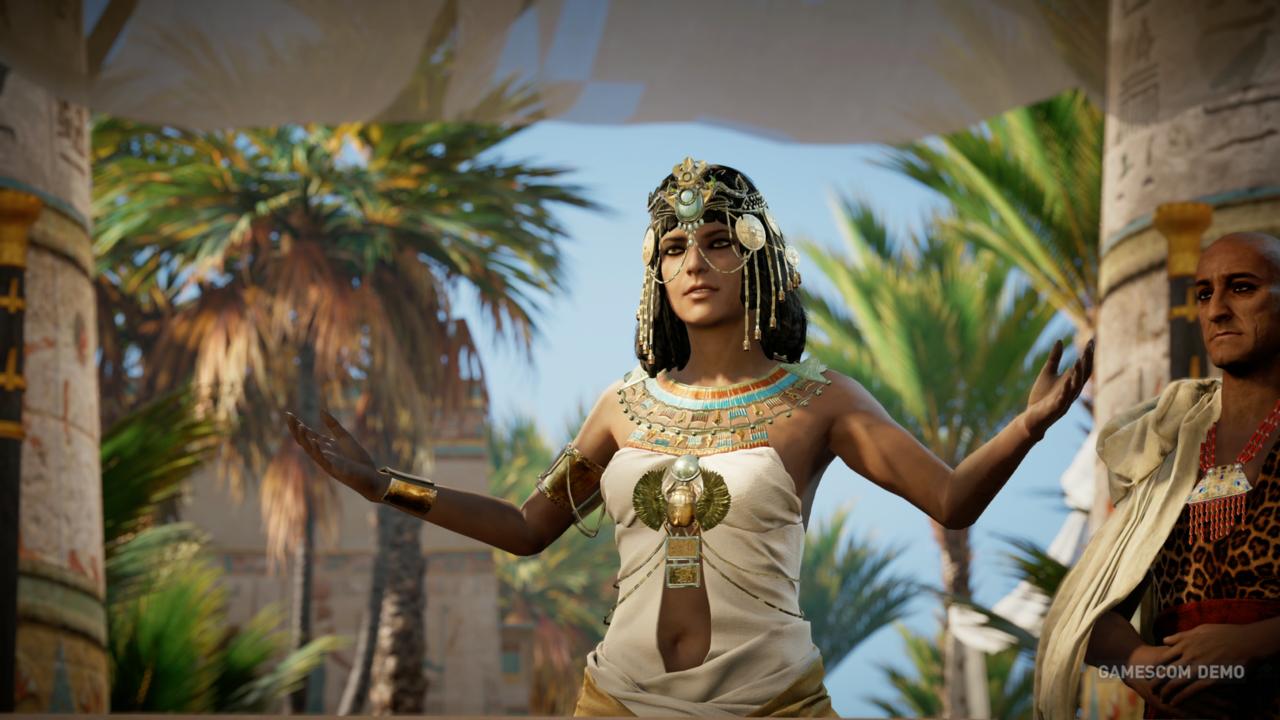The decision to turn Assassin's Creed into an open-world action-RPG is shaping up to be one of the best moves the series has made in years. Assassin's Creed Origins' combat, exploration, and progression feel more involved than in previous games, and there's a high attention to detail that imbues the world with renewed vitality. While the game's new direction is a clear attempt by Ubisoft to reinvigorate the long running franchise, the shift also follows one of its greatest entries, Assassin's Creed IV: Black Flag. After all, the same core creative team is developing Origins; but according to game director Ashraf Ismail, it's also being created using the same design philosophy that made Black Flag so well-received.
Origins is fully entrenched in playing like an action-RPG; it sports a multi-faceted skill tree, damage hit points, and equipment with varying statistics. In addition, everything you do feeds into an overarching progression system that steadily improves your character's strength and abilities over time. While Origins strongly embraces these elements across its various mechanics, it isn't a new concept for the series. You need only look at Black Flag's naval combat, which made heavy use of a stat-based upgrade system. Building up your ship was one of Black Flag's most fulfilling systems, as it continually rewarded you with practical upgrades for your ship the more you faced challenges and steadily learned how to overcome them.
Why Are Video Game Adaptations Good Now? | Spot On Fallout 4 Next Gen Update Comparison Fallout 4 Steam Deck Verified Gameplay ALIEN: Rogue Incursion - Announcement Teaser Trailer Stellar Blade - 13 Things I Wish I Knew S.T.A.L.K.E.R. 2: Heart of Chornobyl — Official "Not a Paradise" Trailer Manor Lords - Official Medieval City Builder/RTS Launch Trailer Honkai: Star Rail - "Then Wake to Weep" | Version 2.2 Trailer Devil May Cry: Peak Of Combat | Dante: Blazing Tempest Gameplay Trailer SAND LAND — Official Launch Trailer Sea of Thieves Season 12: Official Content Update Video Stellar Blade - Hard Mode No Damage Gigas Boss Gameplay
Please enter your date of birth to view this video
By clicking 'enter', you agree to GameSpot's
Terms of Use and Privacy Policy
"We saw that [RPG mechanics] worked in Black Flag," said Ismail. "And so we decided: "Let's blow it up. Let's have it across the whole game. From combat to stealth to manipulating the environment; everything is tied to a progression system [in Origins]. This was a decision we made very early on."
The choice to introduce RPG mechanics into Origins builds upon what worked in Black Flag, expanding its progression systems and giving you more freedom to utilize and embrace your own playstyle. Gone are the days of instant desynchronizations. Now you can play stealthily and pick off opponents from afar to your heart's content, or you can embrace the intricacies of the game's Demon's Souls-inspired combat system and ambush a squad of guards. There's more freedom to do things your way, but what's most apparent about this approach is that it comes from the team's own post-mortem analysis of Black Flag.

"We studied a lot about Black Flag and how it was consumed, and what we saw was that we had two groups," said Ismail. "We had people who were warriors and people who played in stealth. Looking back at Black Flag, we found it frustrating when we slapped the hand of the player because they chose a playstyle different from what the mission wanted, so we decided that we can't do that anymore."
Origins learns from Black Flag's mistakes, but it also leans heavily on that game's design philosophy. For example, you might infiltrate a military camp to obtain more powerful weapons to strengthen your chances against a tough boss encounter during the main quest line. While recent entries offered entertaining side-missions and collectables, they largely felt detached from its overarching systems. Origins attempts to provide more narrative and mechanical payoff for your time spent in its recreation of ancient Egypt.
Origins follows Syndicate in the series' chronological order of releases, but in terms of design, the game feels more like a follow-up to Black Flag. According to Ismail, this was deliberate.
It was our intention to take what we learned from Black Flag and iterate upon that.
Ashraf Ismail, director
"It was our intention to take what we learned from Black Flag and iterate upon that," said Ismail. "Because the feeling that game gave was a sense of openness and exploration, and we took those feelings and we said, 'Okay. We want to hit this and go further.' One element that I personally wasn't as happy with in Black Flag, was we had a good sense of exploration, but not necessarily a sense of discovery. For me there's a difference there. We kept reminding ourselves to provide this feeling in Origins; that you can explore and always find something that rewards you for that exploration."
When Black Flag released in 2013, it was praised for its terrific use of its exploration and how well it balanced its world's diverse range of activities with rewarding progression systems. But a relatively new creative team within Ubisoft Montreal lead by Ismail developed it. With Origins, there's inherently an immense amount of pressure on Ismail and his team to surpass the work they did with Black Flag. After all, the game is largely considered by fans to be one of the best in the series, right up there with Assassin's Creed II and Brotherhood. And then there's the even larger challenge of reinventing the franchise--a task set forth to them by Ubisoft as a result of the diminishing interest in the franchise over the years.

"With [Black Flag], we had something to prove, and with Origins, we have something to live up to on top of this mandate to reinvent the franchise as a whole," said Ismail. "We're not a new team anymore, and we're living up to an image of what Black Flag was. As a result, we felt this obligation to bring something that was important to the fans, as well as something that new players could enjoy. We wanted to create a refreshing experience that's still somehow Assassin's Creed."
Ismail believes they've found a formula that can revitalize the Assassin's Creed franchise. But it wasn't easy; there were initially arguments from the creative team against the shift to action-RPG. Yet Ismail remained adamant, citing that "it was the logical step" and that "there was no other choice." The team inevitably adapted, crafting an experience that he hopes can appeal and impress the full spectrum.
"For both groups, especially for people who've played previous ACs, if they walk away from the game feeling like they just [played] something that was authentically AC, but yet still feels like a drastically different experience, then we have accomplished our objective," said Ismail. "I would love for new players to say: 'I've never played this [type of] game before. It blew my mind. It screamed Egypt. It screamed Assassin's Creed even though I've never played one before."' For me, that's what we're trying to achieve. That's what we want people to say, and that's what we aim to do."

With Origins, it appears Ismail and his team at Ubisoft Montreal are making good on their promise to overcome the fatigue burdening the franchise, while reinventing the series formula in meaningful ways. Whether or not the game is truly the revitalized sequel we've been asking for remains to be seen. However, Origin's connections to Black Flag are undeniable. It may not have pirates, naval combat, or sea shanties, but it maintains the same spirit and design that made that game so captivating, and that's more than enough to get excited about.














